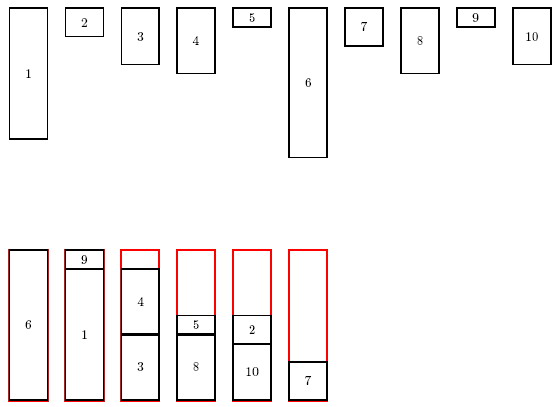POJ 2782 Bin Packing
| Time Limit: 2000MS | Memory Limit: 65536K | |
| Total Submissions: 5513 | Accepted: 2495 |
Description
A set of n 1-dimensional items have to be packed in identical bins. All bins have exactly the same length l and each item i has length li<=l . We look for a minimal number of bins q such that
You are requested, given the integer values n , l , l1 , ..., ln , to compute the optimal number of bins q .
- each bin contains at most 2 items,
- each item is packed in one of the q bins,
- the sum of the lengths of the items packed in a bin does not exceed l .
You are requested, given the integer values n , l , l1 , ..., ln , to compute the optimal number of bins q .
Input
The first line of the input contains the number of items n (1<=n<=105)
. The second line contains one integer that corresponds to the bin
length l<=10000 . We then have n lines containing one integer value
that represents the length of the items.
Output
Your program has to write the minimal number of bins required to pack all items.
Sample Input
10
80
70
15
30
35
10
80
20
35
10
30
Sample Output
6
Hint
The sample instance and an optimal solution is shown in the figure below. Items are numbered from 1 to 10 according to the input order.
![]()

跟《纪念品分组》一样
CODE:
#include <iostream> #include <cstdio> #include <cstring> #include <algorithm> #define REP(i, s, n) for(int i = s; i <= n; i ++) #define REP_(i, s, n) for(int i = n; i >= s; i --) #define MAX_N 100000 + 10 using namespace std; int main(){ int n, len, a[MAX_N]; scanf("%d%d", &n, &len); REP(i, 1, n) scanf("%d", &a[i]); sort(a + 1, a + n + 1); int l = 1, r = n, sum = 0; while(l < r){ if(a[l] + a[r] > len) r --, sum ++; else l ++, r --, sum ++; } if(l > r) printf("%d\n", sum); else if(l == r) printf("%d\n", sum + 1); return 0; }


